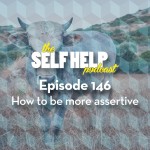How assertive are you?
A listener messaged to ask about being self assertive. For me the issues of self assertion and confidence run together. Confident people find it easier to assert themselves and people who are self assertive will tend to be more confident. A bit of a chicken and egg situation. I guess our starting point is what is self assertion?
In Britain we tend to confuse assertiveness with arrogance yet they are very different. The Cambridge English dictionary defines arrogance as ‘unpleasantly proud and behaving as if you are more important than, or know more than other people’.
It defines assertiveness as ‘someone who behaves confidently and is not frightened to say what they want or believe.’ I would add onto to those two definitions that I often see those who are arrogant as lacking empathy with a tendency to railroad their demands whereas assertive people have empathy and are able to communicate their needs and desires while taking other people’s views, and needs, into account.
So for me it is assertion = good and arrogance = bad.
Arrogant behaviour can also include aggression to enforce it’s demands. Assertive people have the quality of being self-assured and confident without being aggressive.
In social history we have examples of people who have been able to be assertive, on the global stage, in the face of arrogant and aggressive behaviour. For them this is peace versus violence. In recent history Nelson Mandela opted for an assertive approach in facing racial apartheid in South Africa and he adopted an assertive, but cooperative, approach with the truth and reconciliation committee once his goals had been achieved. Martin Luther King used peaceful self assertion in the face of segregation and discrimination in the USA and although the forces of arrogance and violence did eventually kill him his goal was reached. Though the struggle for freedom and the equality of all peoples continues. Mahatma Gandhi, leader of India, used peaceful assertiveness to end British colonial rule in the Indian subcontinent. Sadly he was unable to overcome all of the aggressive arrogance of his fellow Indians that led to the splitting of the subcontinent into what we now know as Pakistan, India and Bangladesh.
There are also many examples in social history of those who used aggressive arrogance to get their own way. The big hitters are the Roman Empire, Attila the Hun, the various European empires, and now the modern larger more powerful countries, the USA, Russia and now potentially China, there continue to be the ravages of various religious groups not least of all Christianity and the individual personalities from Hitler, through the various despots in African and European countries right through to our own Tony Blair and Americas George Bush.
One good thing that history shows us is these negative behaviours do not last forever and good, or so it would appear, wins through in the end.
If you review your life you will be able to remember people who were assertive and those that were aggressive. The strange thing is that in most cases both approaches can have the same effect as the person does get what they want. However, aggressive arrogance is ultimately destructive while peaceful assertion is constructive. Individually we have a choice.
Assertiveness like both behaviours is a skill or habit that is first learned then practiced. If you want to be assertive here are some ideas that may help you.
1: Know what you want
It can be hard to assert an opinion or idea if you are unclear of what you are thinking, meeting or needing. In any interaction in which you need to assert your desires or point of view be very clear about what you want, what is the end game for you?
2: Broken record
When you are clear about your required outcome but the other person will not listen or talks over you try using the broken record technique. This is to simply repeat your point of view, same words in the same way every time you are opposed or expected to do something that you do not want to do. This works particularly well when someone will not take no for and answer. It is version of ‘which part of no do you not understand’ but less controversial, as repeating the same words does not directly challenge the other person.
3: Fogging or Hazing
This is when you avoid direct confrontation by creating fog. If you agree with the antagonist but then state your point of view. In your agreement you validate the person and what they are saying this can defuse them enough for you to state your own point of view…
“ I get what you mean, however….”
“ That is a really good point, perhaps we could also…”
“ An amazing idea but…”
” Yeah, I thought of doing it that way but then I realised…”
” I agree with you that, this and that. However we need to treat this that and the other in a different way …”
4: Owning
‘I’ statements can be used to voice one’s feelings and wishes from a personal position without expressing a judgment about the other person. When I own the statement, feeling or argument I am not blaming the other person for my feelings. Using owning techniques can encourage the person to be more open to supporting us.
” It may just be me but I get the feeling that…”
” I have real problems with that…”
” When you say that it makes me feel… Is that what you wanted?”
” Please can you help with this one, I don’t get why you are saying/thinking/ feeling/doing…?”
The rightness of being able to assert your point of view if beyond doubt. The problems come from your belief that it is true. You are worth the skin that you stand up in and you do have an indisputable right to your point of view. Learning to be assertive is just another habit that, if you practice, you will become good at.
A word of warning. If the antagonist is in a real position of authority it may be that no matter what you do to assert yourself you will not be heard and you may need to, or be required to, move on. This is not a failure, its facing the reality of who you are and who or what your are involved in.
The second thing is being aware of psychopathy. It is said that when you confront a bully they will back down. Well, this is true unless they are a psychopath. A psychopath is someone who lacks empathic insight and therefore lacks emotional awareness, empathy, conscience or care. In dealing with a psychopath the best thing to do is to keep your mouth shut and move, as quickly as possible away from them.
Take care and assert your right to be you.
Sean X



Trackbacks & Pingbacks
[…] Sean wrote a blog post on this subject. Have a read… […]
Leave a Reply
Want to join the discussion?Feel free to contribute!